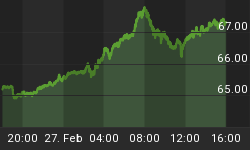
Outlook For Earnings Sparking Concern
Earnings season always causes some hesitation in the bull's camp. As more and more releases hit the wire, the question is will the concerns be justified? From USA Today:
Exercise apparel retailer Lululemon Athletica and fashion chain Express were the latest retailers to cut fourth-quarter earnings outlooks Monday after slow January sales. Lululemon was on track with its sales and earnings guidance through December, chief financial officer John Currie said. But the retailer has seen sales trends so far this month "decelerate meaningfully," Currie said.
Economic Fear Tends To Be Deflationary
Stock market corrections tend to be induced by concerns about the economy and corporate earnings. If the economy were to hit a soft patch, bonds become more attractive as a safe haven alternative to stocks. If you follow the stock market closely, you remember the ugly waterfall decline that took place in August 2011. The ratio of bonds (AGG) relative to stocks (SPY) rises when investor demand for defensive bonds is increasing relative to stocks. The ratio was rising well before the real problems hit the stock market in August 2011.

Bonds Were A Tell In 2007
As we all know, 2008 was an ugly year for the global economy and stock market. The bond-to-stock ratio was rising in 2007 telling stock investors to pay closer attention.

Bonds Can Help In 2014
The demand for bonds has picked up in early 2014. The odds of a more meaningful pullback in stocks will increase if the bond-to-stock ratio can clear the blue trendline and hold the breakout into Friday's close.

Equities Still Experiencing A Taper Drag
The stock market will be much more apt to take tapering in stride if earnings can continue to improve. However, tapering and disappointing earnings reports could spell trouble for stocks. From Bloomberg:
Stocks extended declines Monday after Federal Reserve Bank of Atlanta President Dennis Lockhart said the U.S. economy is on "solid footing" and he would support continued cuts to stimulus. "It sounds as if the Fed is staying on its course of tapering," John Carey, a fund manager at Boston-based Pioneer Investment Management Inc., said in a telephone interview. His firm manages about $220 billion worldwide. "Whatever mixed signals could have come from the jobs numbers, they're looking at the overall picture."
Investment Implications - Incremental Risk Reduction
Our market model makes allocation changes based on observable evidence and hard data; the concepts are described in this "preparing for the next inevitable correction" video. Monday's 1.26% drop in the S&P 500 was accompanied by some concerning deterioration in the market's risk-reward profile. Consequently, we took an incremental step to reduce equity exposure by selling our stake in energy stocks (XLE). The model always steps out of the weakest position in the portfolio first. Incremental risk reduction admits "we could be wrong here", meaning if buyers step in at the trendline below, we still have exposure to stocks, just not as much as we had last Friday.

As outlined in detail in this week's video, the bigger picture from a risk-reward perspective remained positive prior to Monday's sharp selloff in equities. Risk reduction does not mean bearish; it means less bullish. Consequently, we continue to maintain positions in U.S. stocks (VTI), financials (XLF), technology (QQQ), small caps (IJR), Europe (FEZ), and global stocks (VT).















